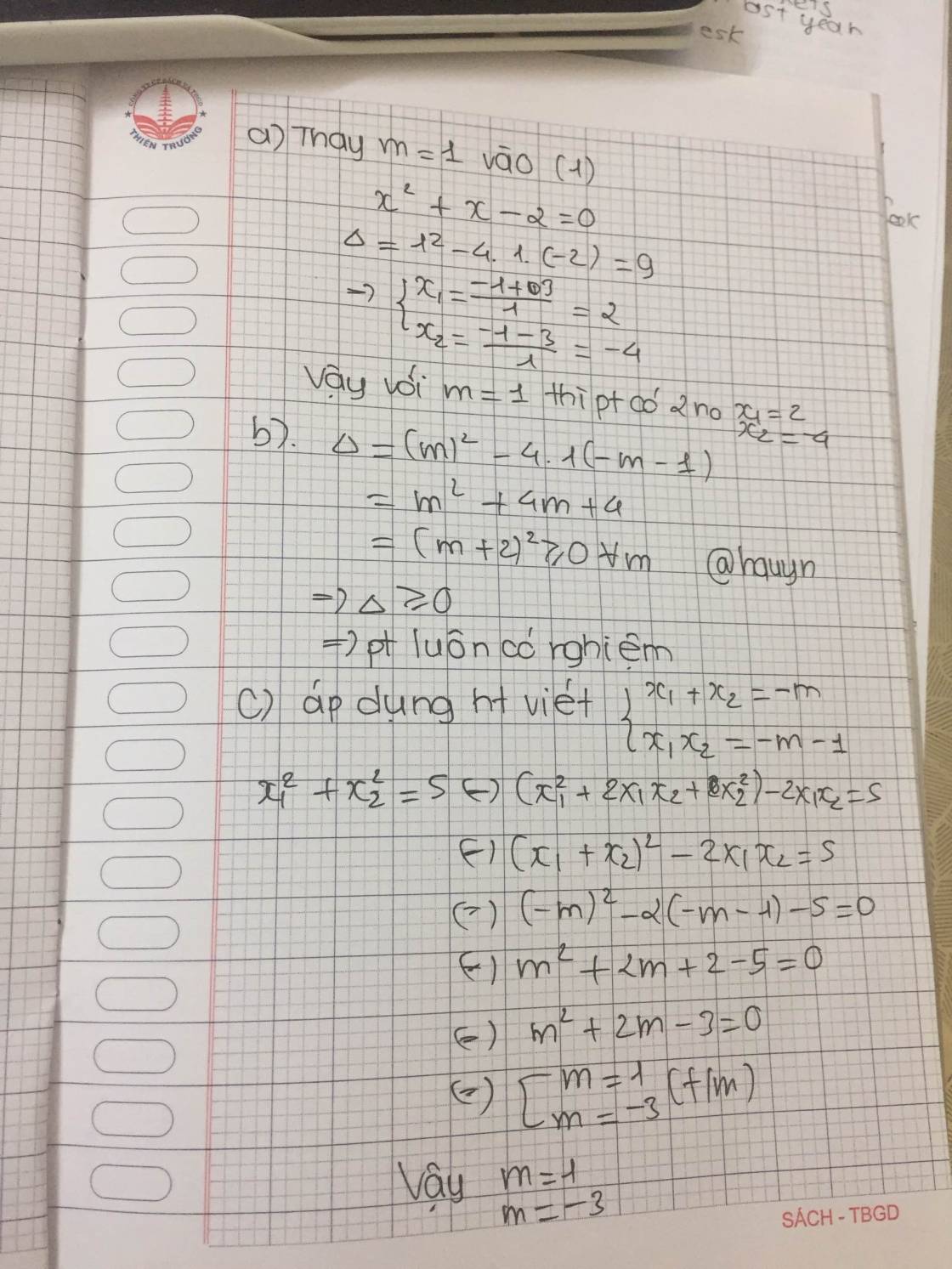Hãy nhập câu hỏi của bạn vào đây, nếu là tài khoản VIP, bạn sẽ được ưu tiên trả lời.

a) \(\Delta=\left[-\left(m+3\right)\right]^2-4.1.m\\ =m^2+6m+9-4m\\ =m^2+2m+9\\ =\left(m+1\right)^2+8>0\forall m\)
Vậy phương trình luôn có 2 nghiệm phân biệt với mọi m.
b) Áp dụng hệ thức Vi-et, ta có:
\(\left\{{}\begin{matrix}x_1+x_2=m+3\\x_1x_2=m\end{matrix}\right.\)
Mà \(x_1^2+x_2^2=6\)
\(\Leftrightarrow\left(x_1+x_2\right)^2-2x_1x_2=6\\ \Leftrightarrow\left(m+3\right)^2-2m=6\\ \Leftrightarrow m^2+6m+9-2m=6\\ \Leftrightarrow m^2+4m+3=0\\ \Leftrightarrow\left(m+1\right)\left(m+3\right)=0\\ \Leftrightarrow\left[{}\begin{matrix}m=-1\\m=-3\end{matrix}\right.\)
Vậy \(m\in\left\{-1;-3\right\}\) là các giá trị cần tìm.
a, Ta có: \(\Delta=\left[-\left(m+3\right)\right]^2-4.1.m\)
\(=m^2+6m+9-4m\)
\(=m^2+2m+9\)
\(=m^2+2m+1+8\)
\(=\left(m+1\right)^2+8\)
Lại có: \(\left(m+1\right)^2\ge0\forall m\Rightarrow\left(m+1\right)^2+8\ge8\forall m\)
Vậy phương trình luôn có 2 nghiêm phân biệt
b, Theo hệ thức Vi-ét: \(\left\{{}\begin{matrix}x_1+x_2=m+3\\x_1+x_2=m\end{matrix}\right.\)
Theo bài ra:
\(x_1^2+x_2^2=6\)
\(\Leftrightarrow\left(x_1+x_2\right)^2-2x_1x_2=6\)
\(\Leftrightarrow\left(m+3\right)^2-2m=6\)
\(\Leftrightarrow m^2+6m+9-2m=6\)
\(\Leftrightarrow m^2+6m+9-2m-6=0\)
\(\Leftrightarrow m^2+4m+3=0\)
\(\Leftrightarrow m^2+m+3m+3=0\)
\(\Leftrightarrow\left(m^2+m\right)+\left(3m+3\right)=0\)
\(\Leftrightarrow m\left(m+1\right)+3\left(m+1\right)=0\)
\(\Leftrightarrow\left(m+1\right)\left(m+3\right)=0\)
\(\Leftrightarrow\left[{}\begin{matrix}m+1=0\\m+3=0\end{matrix}\right.\)
\(\Leftrightarrow\left[{}\begin{matrix}m=-1\\m=-3\end{matrix}\right.\)
Vậy với m=-1 hoặc m=-3 thì phương trinh trên thỏa mãn hệ thức

a, với a=0 thì pt\(\Leftrightarrow x^2-x+1+0=0\)
\(\Leftrightarrow x^2-x+1=0\\ \Leftrightarrow\left(x^2-x+\dfrac{1}{4}\right)+\dfrac{3}{4}=0\\ \Leftrightarrow\left(x-\dfrac{1}{2}\right)^2+\dfrac{3}{4}=0\left(vô.lí\right)\)
Vậy pt vô nghiệm khi a=0
b, Ta có:\(\Delta=\left(-1\right)^2-4.1\left(a+1\right)=1-4\left(a+1\right)=1-4a-4=-4a-3\)
để pt (1) có nghiệm thì \(\Delta\ge0\) hay \(-4a-3\ge0\Leftrightarrow a\le-\dfrac{3}{4}\)

Lời giải:
Áp dụng BĐT Cô-si:
$(x^2+y^2+z^2)(xy+yz+xz)^2=(x^2+y^2+z^2)(xy+yz+xz)(xy+yz+xz)$
$\leq \left(\frac{x^2+y^2+z^2+xy+yz+xz+xy+yz+xz}{3}\right)^3$
$=\frac{(x+y+z)^6}{27}=\frac{3^6}{27}=27$
Vậy max của biểu thức là $27$ khi $a=b=c=1$

(1) => 2x2+2y2+2z2-2xy-2yz-2xz=0
<=> (x2-2xy+y2) + (x2-2xz+z2) + (y2-2yz+z2)=0
<=> (z-y)2 + (x-z)2 + (y-z)2 = 0
<=> x=y=z
(2) => x2002 + x2002 + x2002 = 32003
<=> 3x2002 = 32003
x=y=z=3